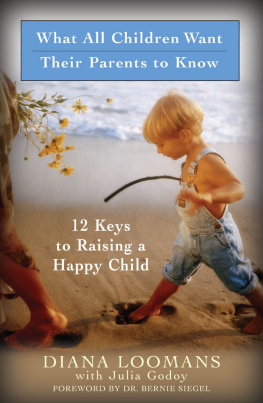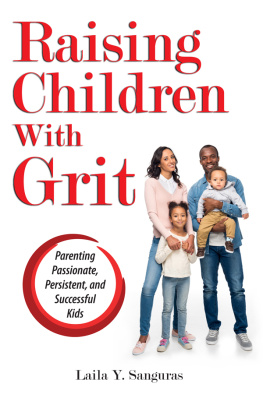With intelligence, humour and a healthy dose of scepticism, Zaske details her experience mothering in Germany to present a portrait of German-style parenting that is at once entertaining, surprising and instructive. With curiosity and insight, she reveals how many of our parenting assumptions stem not from evidence but from insecurity and fear.
Kim Brooks, author of The Houseguest and Small Animals, and editor of Salon.com
I was completely drawn into this marvellous account of how Zaske learned to trust her children and allow them the freedoms they craved. It is the story of one family and, at the same time, of childrens and parents lives in two huge modern nations. I recommend it to all parents, educators, policy makers and others concerned with childrens lives and the future of our society.
Peter Gray, author of Free to Learn
This is a beautiful book. Zaske uses her personal experience raising her children in Berlin to reveal the differences fundamental and trivial, serious and humorous between German and American parenting, finding lessons in the ways Germans rear their children from birth to adolescence. Zaske probes our cultural differences and mines the hard data to offer us her pungent observations. Her insights deserve our attention.
Robert LeVine, author of Do Parents Matter?
If youre wondering where to find happy, normal, un-helicoptered children these days, the answer is: Germany! Zaske looks to a land that trusts its youth, and lays out a smart, sensible path for raising resilient kids.
Lenore Skenazy, founder of the book, blog and movement Free-Range Kids
Published by Piatkus
ISBN: 978-0-349-41854-4
Copyright 2018 Sara Zaske
The moral right of the author has been asserted.
Names and identifying details of some of the people portrayed in this book have been changed.
All German to English translations were done by the author.
All rights reserved. No part of this publication may be reproduced, stored in a retrieval system, or transmitted, in any form or by any means, without the prior permission in writing of the publisher.
The publisher is not responsible for websites (or their content) that are not owned by the publisher.
Piatkus
Little, Brown Book Group
Carmelite House
50 Victoria Embankment
London EC4Y 0DZ
www.littlebrown.co.uk
www.hachette.co.uk
To Zac, Sophia, and Ozzie
SARA ZASKE is an American writer who lived in Berlin for six and a half years. Her articles on her familys experiences in Germany have appeared on Time.com, in the New York Times and in Germanys largest Sunday paper, Bild am Sontag. She now lives in Idaho with her husband and two children.
Few people smile on the trains in Berlin. By some unwritten rule, everyone sits silent and straight-faced on the S-Bahns and U-Bahns that run above and below the city. If you see people who are smiling, chances are theyre tourists. If theyre talking and laughing loudly, chances are theyre American.
One gray day in Berlin, my daughter, Sophia, and I were talking and laughing loudly on an S-Bahn full of quiet German passengers. Sophia was two and a half and super chatty. We had recently arrived in Berlin, and everything was new to her. I wasnt about to shush her as she commented on the things passing by her window: the trees, the stations, another train, the cars on the road. She saw a bus, which was her cue to launch into her favorite song, Wheels on the Bus, at top volume. The wheels really go round in Sophias version. I glanced at the old woman across from us, trying to remember the proper way to phrase an apology, when the most amazing thing happened: she smiled.
Finally, I thought, someone appreciates how adorable my daughter is. Then, the woman opened her purse and pulled out a small piece of candy. She didnt even look at me. She handed it directly to Sophia.
I panicked. I hadnt yet taught Sophia not to trust strangers with candy! In America, people just dont offer candy to children. I battled conflicting impulses: grab Sophia and storm off? Or be polite to the first stranger who had made a friendly gesture?
Sophia turned and held the candy up to me, a huge smile on her face. I let politeness, and logic, prevail: this German grandmother was clearly not trying to kidnap my child, and there was no chance a razor blade could fit in a piece of candy that small. I took it from Sophia, unwrapped it, tried not to be too obvious about examining it, and handed it back to my daughter. She popped it into her mouthand, amazingly, didnt die.
This experience taught me two things: first, Berliners didnt know about stranger danger, and second, my assumption that Germans were unsmiling, unfriendly people who were harsh with children might not be entirely true.
As I would learn over the next six and a half years in Berlin, much of what I thought I knew about Germans was wrongespecially the way they approach raising children. The parents I met were almost the polar opposite of the stereotype of the overbearing, strict German parent. In fact, compared to todays American parents who constantly supervise their children, they were positively relaxed.
When my daughter turned three, we invited a family we had met in our neighborhood to a picnic at a local park. It was a sunny spring day, and the park was beautiful with long stretches of green lawn bordered by tall trees. We chose a spot close to an enclosed playground, which had a tall stone wall in front of it. Shortly after arriving, our friends two children asked if they could go to the playground.
Sure, their mother said.
Can I go too? Sophia asked. I agreed, and all three of them went running off, two three-year-old girls and a five-year-old boy. They disappeared behind the wall, out of sight. No one else moved. Their mother started arranging plates on the picnic blanket. Her husband was talking with mine as he set up the barbecue. Feeling like I was missing something, I got up. Um Ill go, I said.
Oh! the other mother said. Theyll be fine. They play here all the time.
Its just thatSophia might need help, I said and followed the kids.
I remember thinking how strange it was that this couple didnt watch their children on the playground. Then I noticed all the other unsupervised kids running around the park. Some parents were watching over babies and toddlers, but most of the adults were at picnic tables or sitting on blankets talking with each other while their children came and went.
This was normal behavior in Berlin. Parents didnt hover over their children on playgrounds, many of which feature large structures like giant wooden boats and towering pyramids made of rope and metalway more dangerous than the typical American playground of plastic and padded foam. In Berlin, school-age kids also walk to school, parks, and stores alone, or with only their peers as company. Adults rarely interfere in their childrens play, not even their fights, preferring to let them work it out themselves.
Its part of the cultural value of selbstndigkeit, or self-reliance. In America, we might call this free range parenting, but in Germany, its normal parenting. German parents believe that independence is good for children, that handling risk is a necessary part of growing up. This means they trust their children with more tasks as they grow older and supervise them less. Children are also assumed to be capable of making some decisions for themselves even at a young age, including whether or not to take a piece of candy from a nice lady on a train.
Whenever I tell my American friends and family about how much freedom German parents give their children, they react with surprise and disbelief. I usually end up reminding them how long it has been since the end of World War II. Because it is true that German parents were strict and authoritarianin the 1940s. They have changed quite a bit since then.
Next page


